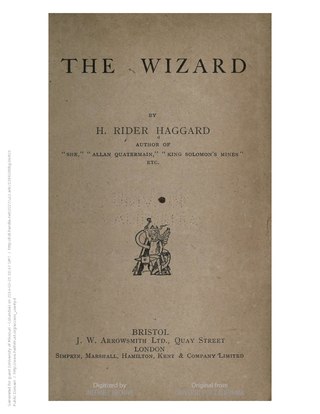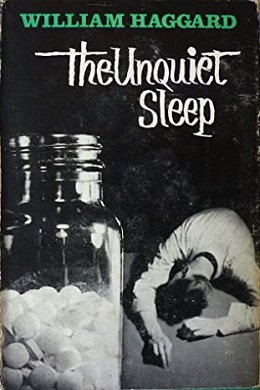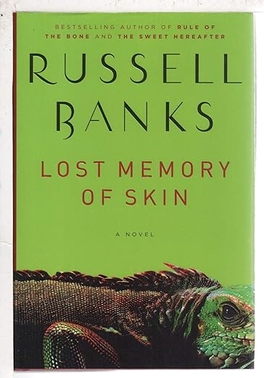Plot
Protagonist is perhaps too strong a word to describe Colonel Russell. As Haggard himself wrote about his fiction:
My novels are chiefly novels of suspense with a background of international politics. A Colonel Charles Russell of the Security Executive, a not entirely imaginary British counter-espionage organization, while not a protagonist in the technical sense, holds the story line together in the background by his operations, while the characters in the foreground carry the action." [1]
As usual with Haggard's books, there are subplots within subplots, but the main theme is a simple one: one of the world's most brilliant scientists, Alexander Gorgan, has been ordered by the President of his native country (unnamed but clearly Yugoslavia) to deliver an address to an eminent group of scientists in London. He is the world's greatest expert in microwaves, which have become vital in the development of anti-ballistic missile defenses. It is a political decision: there are mounting tensions within his country between different groups of Communists, and the Soviets (also unnamed, but clearly identified) are trying to interfere in an unhelpful way. Gorgan is a prize that any of the factions would like to seize (or simply kill), so England, which enjoys friendly relations with Gorgan's President, is seen as being a sanctuary for weeks or even months. And Gorgan's masters have confidence that the Special Branch and Colonel Russell's Security Executive together will be able to secure his safety. Gorgan, however, although a relatively young, hard-living bon vivante, also has a serious neurological issue and he collapses immediately upon arrival in England and is rushed to a private hospital in the countryside where he will spend weeks in fitful recuperation. Seizing this unexpected opportunity, one of the factions immediately makes an attempt on his life but is thwarted by the Security Executive. And now another unforeseen faction appears: Americans, who are nominal allies of the English. Rather than wanting to kill him, at least one of them, an Embassy diplomat and multi-millionaire, merely wants to brainwash him and drain him of his knowledge of microwaves. But Colonel Russell, now aided by the timely reappearance of his "invaluable" aide Major Mortimer from earlier books, enlists the help of James Scobell, [2] an American semi-colleague who clearly works for the unnamed CIA, and with Mortimer and Scobell consulting closely, he arranges an elaborate rescue of Gorgan from a kidnapping contrived to deliver him clandestinely to Russia. At the very end of the book Russell and his ministerial master from earlier books, Gabriel Palliser, are discussing what to do with Gorgan, now arranged by the Yugoslavs to be in England for a long period of time. Sir William Banner, the prominent industrialist from the previous High Wire, is proposed as being a possible patron. Russell agrees but says firmly: "We mustn't cheat." And the Minister replies: "We mustn't be caught out cheating."

Funeral in Berlin is a 1964 spy novel by Len Deighton set between Saturday 5 October and Sunday 10 November 1963. It was the third of Deighton's novels about an unnamed British agent. It was preceded by The IPCRESS File (1962) and Horse Under Water (1963), and followed by Billion-Dollar Brain (1966).

Sir Henry Rider Haggard was an English writer of adventure fiction romances set in exotic locations, predominantly Africa, and a pioneer of the lost world literary genre. He was also involved in land reform throughout the British Empire. His stories, situated at the lighter end of Victorian literature and including the eighteen Allan Quatermain stories beginning with King Solomon's Mines, continue to be popular and influential.

A protagonist is the main character of a story. The protagonist makes key decisions that affect the plot, primarily influencing the story and propelling it forward, and is often the character who faces the most significant obstacles. If a story contains a subplot, or is a narrative made up of several stories, then each subplot may have its own protagonist.

Murder on the Orient Express is a work of detective fiction by English writer Agatha Christie featuring the Belgian detective Hercule Poirot. It was first published in the United Kingdom by the Collins Crime Club on 1 January 1934. In the United States, it was published on 28 February 1934, under the title of Murder in the Calais Coach, by Dodd, Mead and Company. The UK edition retailed at seven shillings and sixpence (7/6) and the US edition at $2.

Thriller is a genre of fiction with numerous, often overlapping, subgenres, including crime, horror, and detective fiction. Thrillers are characterized and defined by the moods they elicit, giving their audiences heightened feelings of suspense, excitement, surprise, anticipation and anxiety. This genre is well suited to film and television.
Manning Coles was the pseudonym of two British writers, Adelaide Frances Oke Manning (1891–1959) and Cyril Henry Coles (1899–1965), who wrote many spy thrillers from the early 1940s through the early 1960s. The fictional protagonist in 26 of their books was Thomas Elphinstone Hambledon, who works for a department of the Foreign Office, usually referred to in the novels as "MI5".
William Haggard was the pseudonym of Richard Henry Michael Clayton, the son of the Rev. Henry James Clayton and Mabel Sarah Clayton. He was an English writer of fictional spy thrillers set in the 1960s through the 1980s, or, as the writer H. R. F. Keating called them, "action novels of international power." Like C. P. Snow, he was a quintessentially British Establishment figure who had been a civil servant in India, and his books vigorously put forth his perhaps idiosyncratic points of view. The principal character in most of his novels is the urbane Colonel Charles Russell of the fictional Security Executive,, who moves easily and gracefully along Snow's Corridors of Power in Whitehall. During the years of the fictional spy mania initially begun by the James Bond stories, Haggard was considered by most critics to be at the very top of the field.

The Serb Volunteer Guard was a Serbian volunteer paramilitary unit founded and led by Željko Ražnatović. It fought in the Croatian War and the Bosnian War during the Yugoslav Wars, and was responsible for numerous war crimes and massacres.

The Face of Another is a 1964 novel written by the Japanese novelist Kōbō Abe. Like other stories written by this author, the novel explores the alienation of modern man from urban society. It is written in the first person narrative mode, and is divided into a prologue, three "notebooks", and a concluding letter from the protagonist's wife. In 1966, it was adapted into a film directed by Hiroshi Teshigahara.

The Pilot: A Tale of the Sea is a historical novel by James Fenimore Cooper, first published in 1823. Its subject is the life of a naval pilot during the American Revolution. It is often considered the earliest example of nautical fiction in American literature. It is one of Cooper's most renowned works and is considered a classic of adventure literature. The novel follows the thrilling adventures of a mysterious and daring seafarer known as "The Pilot."

Colonel H. L. Ross is a fictional character from the series of novels by Len Deighton variously described as the "Secret File" or "Unnamed hero" novels. His first names are not revealed.

Colonel Jack is a novel by Daniel Defoe, first published in 1722. The considerably longer title under which it was originally published is The History and Remarkable Life of the truly Honourable Col. Jacque, commonly call'd Col. Jack, who was Born a Gentleman, put 'Prentice to a Pick−Pocket, was Six and Twenty Years a Thief, and then Kidnapp'd to Virginia, Came back a Merchant; was Five times married to Four Whores; went into the Wars, behav'd bravely, got Preferment, was made Colonel of a Regiment, came over, and fled with the Chevalier, is still abroad compleating a Life of Wonders, and resolves to dye a General.

The Wizard is a novel by Henry Rider Haggard, first published by Longmans, Green, and Co., in 1896. The Wizard is one of the many examples of imperialist literature.
Slow Burner is a 1958 suspense novel by the British author William Haggard published in England by Cassell and in the United States by Little Brown. It was Haggard's first novel and the first of many involving his protagonist Colonel Charles Russell, the head of the urbane unobtrusive but lethal Security Executive, a government counter-intelligence agency clearly based on the actual MI5 or Security Service, who moves easily and gracefully along C. P. Snow's Corridors of Power in Whitehall. Like most of the other works by Haggard and some by his near contemporaries Victor Canning and Michael Gilbert, it is both a standard novel of suspense and a semi-political thriller about the reactions of those in high government positions who scent potential danger to their own political standing from the on-going events of the novel.

Venetian Blind is a 1959 suspense novel by the British author William Haggard published in England by Cassell and in the United States by Ives Washburn. It was Haggard's second of 21 books involving his urbane protagonist Colonel Charles Russell, the head of the unobtrusive but lethal Security Executive, a government counter-intelligence agency clearly based on the actual MI5 or Security Service, where he moves easily and gracefully along C. P. Snow's Corridors of Power in Whitehall. Like all of Haggard's books it has standard elements of suspense thrillers but in addition there is an almost Henry Jamiesian exposition of British establishment mores and character, in both the government and in the world of upper-class financiers, scientists, industrialists, their families, and hangers-on, making it very much a novel of character.

The Arena is a 1961 suspense novel by the British author William Haggard published in England by Cassell and in the United States by Washburn. It was Haggard's third of 21 books involving his urbane protagonist Colonel Charles Russell, the head of the unobtrusive but lethal Security Executive, a government counter-intelligence agency clearly based on the actual MI5 or Security Service, where he moves easily and gracefully along C. P. Snow's Corridors of Power in Whitehall. Like all of the other works by Haggard it is a standard novel of suspense, but combined, as usual with Haggard, with other elements: the reactions of those in high government positions who fear non-political events that could endanger Britain's place in the world, along with a tough-minded, even cynical depiction of financial shenanigans in the City of London. And like Venetian Blind, Haggard's previous book, it is very much a novel of character, albeit a bleak one.

The Unquiet Sleep is a 1962 suspense novel by British author William Haggard which was published in England by Cassell and in the United States by Ives Washburn. It is the 4th novel in a series of 21 books that involve urbane protagonist, Colonel Charles Russell. Russel is the head of the Security Executive, a government counterintelligence agency based on the actual MI5 or Security Service. He moves easily and gracefully along C. P. Snow's Corridors of Power in Whitehall. As in Haggard's earlier books, it has the standard elements of a suspense thriller along with detailed examinations of character, but with more scenes of direct action and somewhat less dissection of character and motivation from the first three books.

Lost Memory of Skin is a literary novel by American author Russell Banks.














